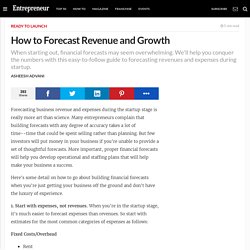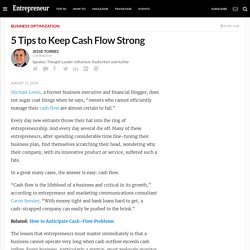

How to Forecast Revenue and Growth. Forecasting business revenue and expenses during the startup stage is really more art than science.

Many entrepreneurs complain that building forecasts with any degree of accuracy takes a lot of time--time that could be spent selling rather than planning. But few investors will put money in your business if you're unable to provide a set of thoughtful forecasts. More important, proper financial forecasts will help you develop operational and staffing plans that will help make your business a success. Here's some detail on how to go about building financial forecasts when you're just getting your business off the ground and don't have the luxury of experience. 1. Fixed Costs/Overhead RentUtility billsPhone bills/communication costsAccounting/bookkeepingLegal/insurance/licensing feesPostageTechnologyAdvertising & marketingSalaries Variable Costs Cost of Goods SoldMaterials and suppliesPackagingDirect Labor CostsCustomer serviceDirect salesDirect marketing 2. 3.
Forecasting Business Success Through the Lens of the Product and the Brand. Reader Resource Position yourself for growth in 2017—join us live at the Entrepreneur 360™ Conference in Long Beach, Calif. on Nov. 16.

Secure Your Seat » Good marketers conduct very thorough analyses when doing market research, product testing, branding perceptions and, of course, forecasting. Big businesses, especially those that are publically traded, spend significant time forecasting sales and measuring results against projections. And while you may not have a board of directors or “The Street” asking you for a forecast, it’s important for small-business owners and entrepreneurs to also project ahead so that they can plan accordingly. Related: 6 Ways to Make Financial Forecasts More Realistic Now, I’m not going to share sophisticated forecasting models with you here -- the true analytics vary by industry and category.
Forecasting the product (or service) To manage your business effectively, you should understand the factors that will affect your product sales and plan accordingly. What is Cash Flow, and What Is It for Entrepreneurs? - Wealth Factory. What is cash flow?

More importantly, what is cash flow for entrepreneurs? And how you can you use it to build the life you love? Most finance is about building net worth. It’s about building a nest egg and letting compound interest do its thing while you don’t touch your money for 30 years. Cash flow, business owners know, is about how often money comes in, how easily accessible your money is, and how much it actually flows. If there’s a lot of net worth, but no cash flow, you could even end up in bankruptcy, because you might have bills to pay, and obligations that you can’t meet. Poor cash flow can lead to squeezing you out of your wealth. Bottom line dollars are what count. Top line revenue is great, but cash flow and bottom line is about: what can you do with it once it’s gone through expenses, taxes, what’s left over to give you liquidity and safety, and ultimately give you a chance at wealth.
We’re specialists at helping entrepreneurs increase their cash flow by: It’s the right systems. 5 Tips to Keep Cash Flow Strong. Michael Lewis, a former business executive and financial blogger, does not sugar coat things when he says, “owners who cannot efficiently manage their cash flow are almost certain to fail.”

Every day new entrants throw their hat into the ring of entrepreneurship. And every day several die off. Many of these entrepreneurs, after spending considerable time fine-tuning their business plan, find themselves scratching their head, wondering why their company, with its innovative product or service, suffered such a fate. In a great many cases, the answer is easy: cash flow. “Cash flow is the lifeblood of a business and critical in its growth,” according to entrepreneur and marketing communications consultant Caron Beesley.
Related: How to Anticipate Cash-Flow Problems The lesson that entrepreneurs must master immediately is that a business cannot operate very long when cash outflow exceeds cash inflow. 1. Similarly, it is necessary to estimate expenses and other cash outlays. 2. 3. 4. 5. The Startup Guide - Creating a Better World Through Entrepreneurship. The iContact Team in October 2011 By Ryan Allis Being the CEO of a startup is one of the most challenging roles out there. Your job is to build a product customers love; recruit a team; find funding from customers, partners, or investors; and guide the overall prioritization of work. In my experience the three most important components of the Start-up CEO’s role are: Creating a product that solves a real customer need (and convincing customers to pay for it).Making sure your users and customers have an extremely positive emotional experience with your product.Recruiting a great team to build your product.
Yes, you’re also in charge of incorporating, finding a place to work, creating the foundations of your culture, hiring your first employees, setting up a bank account, creating a web site, finding early stage funding, and taking out the trash. Here’s what I learned at iContact about being a startup CEO. Before You Have Employees Determining the Initial Equity Split Incorporating.